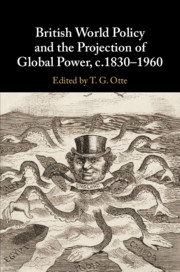Book contents
- British World Policy and the Projection of Global Power, c.1830–1960
- British World Policy and the Projection of Global Power, c.1830–1960
- Copyright page
- Dedication
- Contents
- Notes on the Contributors
- Preface and Acknowledgements
- Introduction: British World Policy and the White Queen’s Memory
- 1 The War Trade Intelligence Department and British Economic Warfare during the First World War
- 2 The British Empire and the Meaning of ‘Minimum Force Necessary’ in Colonial Counter-Insurgencies Operations, c.1857–1967
- 3 Yokohama for the British in the Late Nineteenth Century: A Hub for Imperial Defence and a Node of Influence for Change
- 4 ‘The Diplomatic Digestive Organ’: The Foreign Office As the Nerve Centre of Foreign Policy, c.1800–1940
- 5 Financial and Commercial Networks between Great Britain and South America during the Long Nineteenth Century
- 6 Britain through Russian Eyes: 1900–1914
- 7 Imperial Germany’s Naval Challenge and the Renewal of British Power
- 8 Views of War, 1914 and 1939: Second Thoughts
- 9 The Ambassadors, 1919–1939
- 10 The Tattered Ties that Bind: The Imperial General Staff and the Dominions, 1919–1939
- 11 Seeking a Family Consensus? Anglo-Dominion Relations and the Failed Imperial Conference of 1941
- 12 Imperial Hubs and their Limitations: British Assessments of Imposing Sanctions on Japan, 1937
- Index
11 - Seeking a Family Consensus? Anglo-Dominion Relations and the Failed Imperial Conference of 1941
Published online by Cambridge University Press: 06 September 2019
- British World Policy and the Projection of Global Power, c.1830–1960
- British World Policy and the Projection of Global Power, c.1830–1960
- Copyright page
- Dedication
- Contents
- Notes on the Contributors
- Preface and Acknowledgements
- Introduction: British World Policy and the White Queen’s Memory
- 1 The War Trade Intelligence Department and British Economic Warfare during the First World War
- 2 The British Empire and the Meaning of ‘Minimum Force Necessary’ in Colonial Counter-Insurgencies Operations, c.1857–1967
- 3 Yokohama for the British in the Late Nineteenth Century: A Hub for Imperial Defence and a Node of Influence for Change
- 4 ‘The Diplomatic Digestive Organ’: The Foreign Office As the Nerve Centre of Foreign Policy, c.1800–1940
- 5 Financial and Commercial Networks between Great Britain and South America during the Long Nineteenth Century
- 6 Britain through Russian Eyes: 1900–1914
- 7 Imperial Germany’s Naval Challenge and the Renewal of British Power
- 8 Views of War, 1914 and 1939: Second Thoughts
- 9 The Ambassadors, 1919–1939
- 10 The Tattered Ties that Bind: The Imperial General Staff and the Dominions, 1919–1939
- 11 Seeking a Family Consensus? Anglo-Dominion Relations and the Failed Imperial Conference of 1941
- 12 Imperial Hubs and their Limitations: British Assessments of Imposing Sanctions on Japan, 1937
- Index
Summary
In 1941, when the fortunes of the British Empire were at their nadir, pressures were building in London and the dominions for an imperial war conference. The idea was to repeat the apparent successes of the 1917 and 1918 imperial war conferences which helped shape future strategy in the latter stages of the Great War. This little understood episode has been largely overlooked or ignored by diplomatic and imperial historians alike. Yet, the failed imperial war conference of 1941 provides invaluable insight into the inner workings of the Anglo-dominion wartime relationship, and so illuminates a key aspect of British global power. The Australian and New Zealand leadership, led by Prime Ministers R. G. Menzies and Peter Fraser respectively, were especially keen to hold a conference in the aftermath of the failed Greek campaign of April–June 1941. The Canadians, led by the mercurial William Lyon Mackenzie King, and the South Africans, directed by the shrewd Jan Smuts, were not; neither was the doughty British leader, Winston Churchill, who had hesitantly supported the idea of a fuzzily named ‘supreme’ war council in October 1940.
- Type
- Chapter
- Information
- Publisher: Cambridge University PressPrint publication year: 2019



